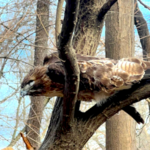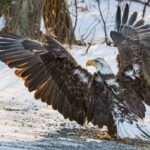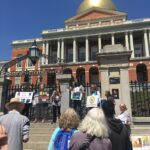
By Fred Bouchard Owls have pop cred and cool cachet. These regal predators of the dark hours are icons of wisdom and spookiness: secretive, inscrutable, hair-raising. Kids are drawn to their candid, piercing, surprised eyes. They are harbingers of the occult and the unknown. With feather-soft wingbeats, owls are inaudible in flight, the better to sneak up and snatch unwary prey with razor-sharp talons. Owls’ amazing eyes have huge corneas and pupils. Their retina’s plentiful rods are super-sensitive to light and movement though a paucity of cones limits perception of color. Yes, they really can rotate (not spin) their heads [READ MORE]






